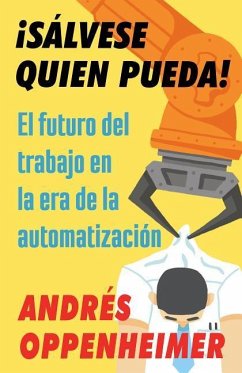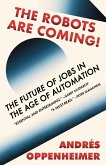Manteniéndose fiel a su característico estilo periodístico, Andrés Oppenheimer lleva a sus lectores en un nuevo viaje, esta vez a través del mundo, con la intención de comprender cuál será el futuro de los trabajos de hoy en el día, mientras se aproxima lo que muchos han denominado como la era de la automatización. Tal como lo indican dos de los entrevistados de Oppenheimer -ambos expertos en tecnología y economía de la Universidad de Oxford- el cuarenta y siete por ciento de los trabajos existentes corren el riesgo de automatizarse o volverse obsoletos debido a los avances tecnológicos y el crecimiento de los productos y servicios en línea que están por venir en los próximos veinte años. Oppenheimer conversa con expertos en sus campos y examina los cambios que ya comienzan a desarrollarse en varias áreas de empleo, incluyendo en la industria de alimentos, en el mundo legal, en la banca y en la medicina. Oppenheimer contrapone también las perspectivas de los "tecno-optimistas" con las de los "tecno-negativistas" e intenta encontrar un término medio entre una visión alarmista del futuro y una que es demasiado acrítica. Autodenominado un "optimista cauteloso", Oppenheimer opina que la tecnología no necesariamente creará un desempleo masivo, sino más bien cambiará drásticamente la definición de lo que hoy conocemos como un "empleo". ENGLISH DESCRIPTION Staying true to his trademark journalistic approach, Andrés Oppenheimer takes his readers on yet another journey, this time across the globe, in a thought-provoking search to understand what the future holds for today's jobs in the foreseeable age of automation. The Robots Are Coming! centers around the issue of jobs and their future in the context of rapid automation and the growth of online products and services. As two of Oppenheimer's interviewees -- both experts in technology and economics from Oxford University -- indicate, forty-seven percent of existing jobs are at risk of becoming automated or rendered obsolete by other technological changes in the next twenty years. Oppenheimer examines current changes in several fields, including the food business, legal work, banking, and medicine, speaking with experts in the field, and citing articles and literature on automation in various areas of the workforce. He contrasts the perspectives of "techno-optimists" with those of "techno-negativists" and generally attempts to find a middle ground between an alarmist vision of the future, and one that is too uncritical. A self-described "cautious optimist", Oppenheimer believes that technology will not create massive unemployment, but rather will drastically change what work looks like.
Hinweis: Dieser Artikel kann nur an eine deutsche Lieferadresse ausgeliefert werden.
Hinweis: Dieser Artikel kann nur an eine deutsche Lieferadresse ausgeliefert werden.








